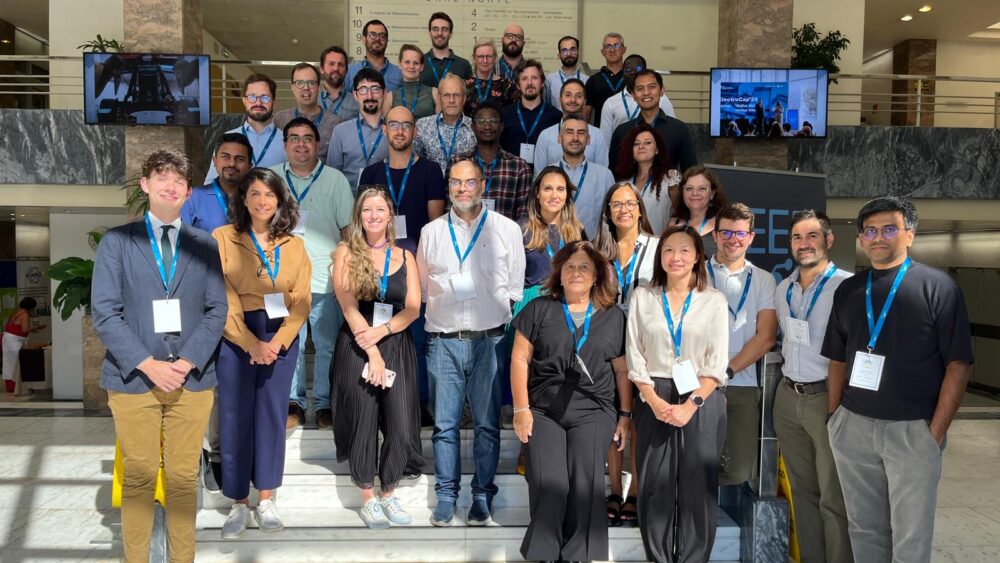The U2Demo kick-off meeting took place on September 5th and 6th at INESC-ID and Instituto Superior Técnico in Lisbon, bringing together over 30 participants from the project consortium, which comprises 16 main partners and 2 associated partners from 8 European countries.
With an overall funding of 5 million euros, the U2Demo project aims to create consumer-centered management strategies that facilitate citizens participation in Peer-to-Peer (P2P) trading and energy sharing. The main goal is to promote fairer and more democratic access to renewable energy resources by studying different energy communities, composed of citizens, industry, services entities or institutions that are organized to generate, share, and consume renewable energy collectively and in a decentralized approach.
The U2Demo project seeks to empower and actively involve consumers and “prosumers” – those capable of producing, storing, and/or controlling electricity consumption – in energy production and sharing services to maximize their benefits and contribute to grid optimization. At the end of the project, all solutions will be made available through Open-Source platforms and will be accessible to everyone.
“The key advantage of this project is that the tools developed will be available in open-source, considering new opportunities for participation in system services and taking into account social aspects aimed at reducing energy poverty,” explains Hugo Morais, researcher and project coordinator at the Portuguese R&D Institute INESC-ID.
The developed solutions will be tested in at least four different existing Energy Communities in Portugal, Belgium, Italy, and the Netherlands, each with unique characteristics and models.
According to Hugo Morais, “The U2Demo project proposes to develop a set of tools for energy exchange between community members and the trading of benefits produced through the delivery of system services. Additionally, tools for consumption and production, forecasting, data analysis, and decision-making support will also be provided.”
In addition to the economic benefits of these solutions, social aspects such as overcoming energy poverty will also be considered: “The development of energy-sharing models and Peer-to-Peer (P2P) markets will contribute to increased energy efficiency and reduced costs. Beyond the technical aspects, the U2Demo project aims to promote equal access to renewable resources, contributing to reducing energy poverty across Europe,” shares the researcher.
The energy communities involved in the project use renewable energy sources such as solar or wind and include both consumers and prosumers. The Portuguese pilot will be located in Valverde, a small rural village in Évora with about 450 inhabitants. Valverde is already involved in projects like DOMINOES and InteGrid, and is equipped with advanced devices for local energy monitoring and control. In this pilot, the project will test the concept of Peer-to-Peer (P2P) energy trading within a Renewable Energy Community (REC) to evaluate and compare energy-sharing algorithms in a regulated environment.
In addition to Portugal, the project will have pilots in Italy, Belgium, and the Netherlands. In Belgium, the pilot will have a strong social feature, focusing on overcoming energy poverty, as the demo will take place in a social housing neighborhood in the province of Antwerp. This pilot will be led by Klimaan, a local cooperative managing a Citizen Energy Community (CEC) in the Otterbeek social neighborhood. The area faces low acceptance of new concepts by residents, resulting in an excess of solar energy due to low demand. One of the project’s objectives is to analyze the reasons for this situation and explore ways to overcome it.
The initiative, funded through the Horizon Europe program for 42 months, involves the participation of twenty partner institutions from eight European countries, including Belgium (E.DSO, Klimaan, KU Leuven, Rescoop VL, VITO), France (Artelys, EXAION), Germany (EIFER), Italy (EnGreen, EUI), the Netherlands (TNO, Den Haag, STEDIN), Portugal (EDP NEW, INESC-ID, R&D Nester, Watt -IS), Slovakia (iEPD) and Switzerland (Energy Web).





Comments are closed.